When I first started living in an RV, I had visions of endless road trips, sun-kissed mornings by lakes, and meeting quirky people in campgrounds across the country.
Oh, how naive I was. Sure, there were epic sunrises, but there were also flat tires in the middle of nowhere, a clogged toilet at 2 a.m., and a storm that almost had me questioning my life choices.
But after 15 years of life on the road, I can confidently tell you this: living in an RV isn’t just about the freedom to roam—it’s about learning how to fix your own mess when your rig turns into a rolling disaster. If you’re ready to hit the road but want a full, no-holds-barred look at the highs and lows of RV life, keep reading.
What Are the Real Benefits of Living in an RV?
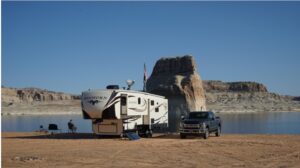
Isn’t it all about freedom?
Living in an RV has a certain magnetism for those who crave the freedom to go wherever the road takes them. Imagine waking up to the sound of a river, stepping out of your rig, and having a cup of coffee by the ocean or in the mountains. The best part? You don’t have to leave the comfort of home behind. In an RV, you decide where “home” is.
Saving Money or Breaking the Bank?
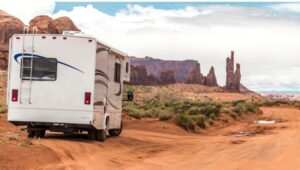
The truth is, RV living can be more affordable than traditional housing, but it depends on how you do it. If you’re into free camping (also known as boondocking), you can bypass park fees and live on a shoestring budget. But if you’re planning to stay at resorts with full hookups, that’s going to cost you.
Living in an RV can also eliminate mortgage or rent payments, but don’t forget about insurance, gas, and maintenance costs. Trust me, it’s not all sunshine and rainbows when your fridge dies in the middle of a desert.
A Minimalist Lifestyle for the Win?
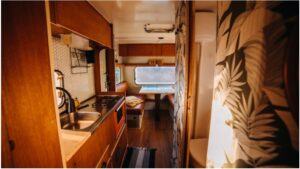
Living in an RV forces you to downsize. And I mean really downsize. There’s no room for your entire wardrobe, your collection of vintage board games, or those 15 coffee mugs you swear you need. But what you’ll gain is a simpler life—less stuff, more experiences.
Every trip feels like a new adventure because you’re always on the move, meeting new people, and discovering new places. Your “stuff” starts to feel less important, and that’s a pretty freeing feeling.
What Are the Real Struggles of Living in an RV?
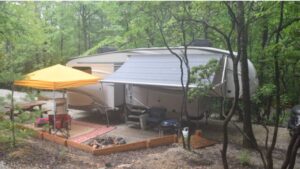
How Much Space Do You Really Need?
I’ll tell you right now: living in an RV means embracing a lot less space than you’re probably used to. Sure, your rig may have a kitchen, bathroom, and a cozy bed, but it’s still a far cry from a spacious home. You’ll get cozy in ways you never imagined, but don’t expect to stretch out or have a ton of room for activities. Downsizing is often a necessary step, but it’s not for everyone.
What About Maintenance?

As much as RV living can be cost-effective, it can also be expensive when it comes to maintenance. I learned this the hard way after a weekend spent on the side of the road in 100-degree heat, waiting for a tow truck to take my rig to the shop.
Routine maintenance is a must—think oil changes, tire checks, and regular system inspections—but even the best-maintained rigs are prone to issues. Therefore, be sure to budget for unexpected repairs. They’ll happen. I promise.
Can You Handle the Weather?
RV for full time living means you’re at the mercy of the elements. One minute you’re basking in the warm sun, and the next minute, you’re caught in a thunderstorm.
Whether it’s freezing temperatures or sweltering heat, the weather will affect your comfort level. And if your RV isn’t properly insulated or designed for extreme weather, you’re going to feel it. But don’t worry, with the right setup and preparation, you can survive—just be ready to make some adjustments on the fly.
How Can You Manage the Legalities of Living in an RV?
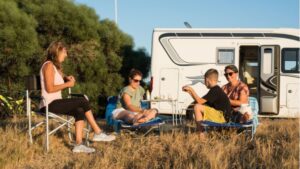
What Do You Need to Know About Local Laws?
Yes, living in an RV full-time is generally legal in the U.S., but you’ve got to keep track of where you park. Cities and towns have specific zoning laws that restrict long-term parking or staying in an RV. This is where it gets tricky. While you can camp for a night or two in some places, extended stays might require you to find a designated RV park.
On top of that, you’ll need to establish a domicile in a state—no, you can’t just be homeless in a van by the river (unless you’re ok with the boho vibe, which is totally cool, but not practical). This means registering your vehicle, obtaining a driver’s license, and complying with any local regulations.
How Do You Boondock and Stay Legal?
Boondocking, or camping without hookups, is a fantastic way to save money, but it’s not as simple as pulling up anywhere. There are time limits and waste disposal regulations, and you’ll need to respect the land. Many places allow you to camp for free, but make sure you research the area for specific rules.
Believe me, you don’t want to deal with the authorities while trying to figure out how to dump your black tank.
FAQ: All Your Burning RV Questions Answered
1. How much does it really cost to live in an RV full-time?
It varies, but on average, full-time RVers spend around $1,500 to $3,000 a month. This includes gas, insurance, maintenance, and campsite fees. If you boondock often, you can lower costs significantly. But don’t forget—those surprise repairs? They can throw off your budget in a heartbeat.
2. Can I really live in an RV with kids or pets?
Yes, but it’s a challenge. Kids and pets mean less space, more mess, and more maintenance. You’ll need to organize your rig carefully to keep things running smoothly. But hey, some families thrive on the road and make it work!
3. How do I stay connected to the internet while living in an RV?
Internet can be tricky on the road. Many campgrounds offer Wi-Fi, but it’s often slow. I recommend using mobile hotspots or satellite internet services if you need a reliable connection. Just keep in mind that some remote areas won’t have a signal at all.
Final Scoop Before You Jump In
Alright, here’s the deal—living in an RV is not for the faint of heart. You’ve got to love adventure, embrace unpredictability, and be ready to fix anything that breaks (trust me, it will).
But if you’ve got the right mindset, the right rig, and the right attitude, it’s one of the most rewarding lifestyles you can experience. So, go ahead—take the plunge, and get ready for a wild ride.
My tip? Keep an open mind and a repair kit. You’ll need both!

